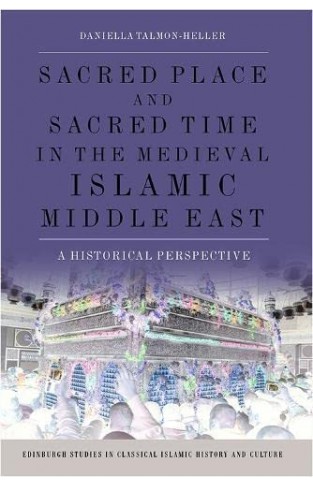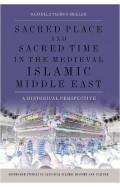- Home
- Non Fiction
- History
- Sacred Place and Sacred Time in the Medieval Islamic Middle East - A Historical Perspective
Sacred Place and Sacred Time in the Medieval Islamic Middle East - A Historical Perspective
By: Daniella Talmon Heller
-
Rs 3,022.25
- Rs 5,495.00
- 45%
You save Rs 2,472.75.
Due to constant currency fluctuation, prices are subject to change with or without notice.
Sacred Place and Sacred Time in the Medieval Islamic Middle East - A Historical Perspective
By: Daniella Talmon Heller
Rs 3,022.25 Rs 5,495.00 Ex Tax :Rs 3,022.25
Zubin Mehta: A Musical Journey (An Authorized Biography)
By: VOID - Bakhtiar K. Dadabhoy
Rs 472.50 Rs 1,050.00 Ex Tax :Rs 472.50
The Greatness Mindset - Unlock the Power of Your Mind and Live Your Best Life Today
By: Lewis Howes
Rs 4,405.50 Rs 4,895.00 Ex Tax :Rs 4,405.50
How to Understand and Deal with Health Anxiety - Everything You Need to Know to Manage Health Anxiety
By: Katy Georgiou
Rs 2,471.25 Rs 3,295.00 Ex Tax :Rs 2,471.25
Decisionscape - How Thinking Like an Artist Can Improve Our Decision-Making
By: Elspeth Kirkman
Rs 7,496.25 Rs 9,995.00 Ex Tax :Rs 7,496.25
Where Research Begins - Choosing a Research Project That Matters to You (and the World)
By: Thomas S Mullaney
Rs 6,296.25 Rs 8,395.00 Ex Tax :Rs 6,296.25
The Interior Design Handbook - Furnish, Decorate, and Style Your Space
By: Frida Ramstedt
Rs 6,146.25 Rs 8,195.00 Ex Tax :Rs 6,146.25
The Origins of Political Order From Prehuman Times to the French RevolutioN
By: Francis Fukuyama
Rs 3,505.50 Rs 3,895.00 Ex Tax :Rs 3,505.50
Manning Up: How the Rise of Women Has Turned Men into Boys
By: Kay Hymowitz
Rs 646.75 Rs 995.00 Ex Tax :Rs 646.75
The Obama Syndrome: Surrender At Home War Abroad
By: Tariq Ali
Rs 1,165.50 Rs 1,295.00 Ex Tax :Rs 1,165.50
The Quest For Meaning: Developing A Philosophy Of Pluralism
By: Tariq Ramadan
Rs 1,255.50 Rs 1,395.00 Ex Tax :Rs 1,255.50
The Pakistan US Conundrum Jihadists The Military And The People The Struggle For Control
By: Yunas Samad
Rs 1,255.50 Rs 1,395.00 Ex Tax :Rs 1,255.50
An Enemy We Created: The Myth Of The Taliban Al Qaeda Merger In Afghanistan 19702010
By: Alex Strick van Linschoten
Rs 3,412.50 Rs 5,250.00 Ex Tax :Rs 3,412.50
WikiLeaks: Inside Julian Assanges War on Secrecy
By: David Leigh & Luke Harding
Rs 552.50 Rs 850.00 Ex Tax :Rs 552.50
The Greatness Mindset - Unlock the Power of Your Mind and Live Your Best Life Today
By: Lewis Howes
Rs 4,405.50 Rs 4,895.00 Ex Tax :Rs 4,405.50
How to Understand and Deal with Health Anxiety - Everything You Need to Know to Manage Health Anxiety
By: Katy Georgiou
Rs 2,471.25 Rs 3,295.00 Ex Tax :Rs 2,471.25
Decisionscape - How Thinking Like an Artist Can Improve Our Decision-Making
By: Elspeth Kirkman
Rs 7,496.25 Rs 9,995.00 Ex Tax :Rs 7,496.25
Where Research Begins - Choosing a Research Project That Matters to You (and the World)
By: Thomas S Mullaney
Rs 6,296.25 Rs 8,395.00 Ex Tax :Rs 6,296.25
The Interior Design Handbook - Furnish, Decorate, and Style Your Space
By: Frida Ramstedt
Rs 6,146.25 Rs 8,195.00 Ex Tax :Rs 6,146.25
No recently viewed books available at the moment.
Zubin Mehta: A Musical Journey (An Authorized Biography)
By: VOID - Bakhtiar K. Dadabhoy
Rs 472.50 Rs 1,050.00 Ex Tax :Rs 472.50
Sacred Place and Sacred Time in the Medieval Islamic Middle East - A Historical Perspective
By: Daniella Talmon Heller
Rs 3,022.25 Rs 5,495.00 Ex Tax :Rs 3,022.25
The Greatness Mindset - Unlock the Power of Your Mind and Live Your Best Life Today
By: Lewis Howes
Rs 4,405.50 Rs 4,895.00 Ex Tax :Rs 4,405.50
How to Understand and Deal with Health Anxiety - Everything You Need to Know to Manage Health Anxiety
By: Katy Georgiou
Rs 2,471.25 Rs 3,295.00 Ex Tax :Rs 2,471.25
Decisionscape - How Thinking Like an Artist Can Improve Our Decision-Making
By: Elspeth Kirkman
Rs 7,496.25 Rs 9,995.00 Ex Tax :Rs 7,496.25
Where Research Begins - Choosing a Research Project That Matters to You (and the World)
By: Thomas S Mullaney
Rs 6,296.25 Rs 8,395.00 Ex Tax :Rs 6,296.25
The Interior Design Handbook - Furnish, Decorate, and Style Your Space
By: Frida Ramstedt
Rs 6,146.25 Rs 8,195.00 Ex Tax :Rs 6,146.25














-120x187.jpg?q6)











-120x187.jpg?q6)



-120x187.jpg?q6)



